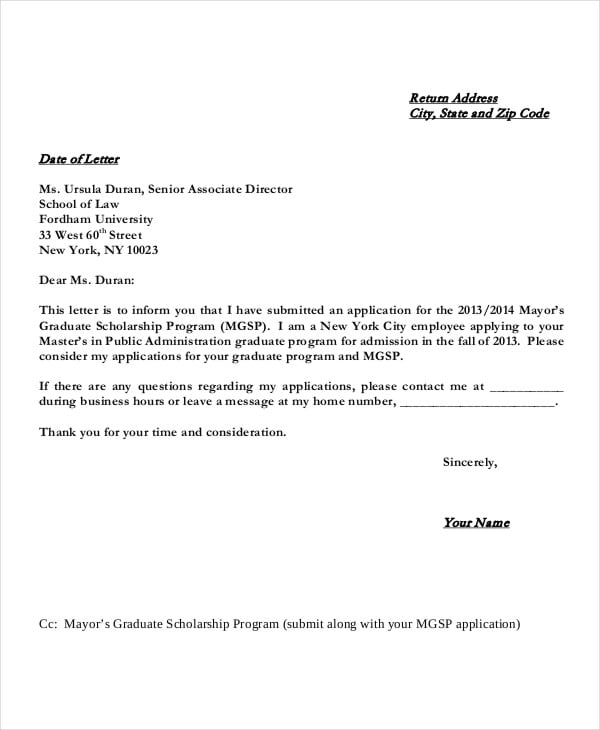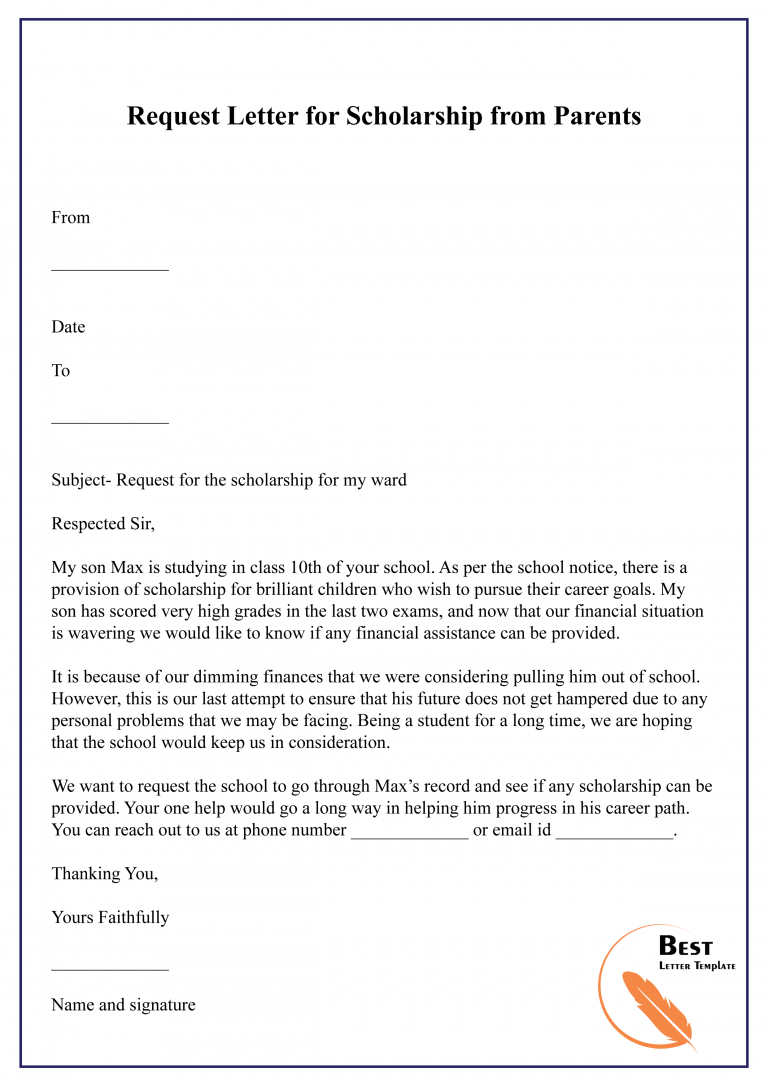Dreaming of pursuing your dream education but facing financial hurdles? Scholarships are a beacon of hope for many aspiring students, but securing one requires more than just good grades. A well-crafted application letter can be your ticket to unlocking financial support and reaching your academic goals. In this guide, we’ll delve into the art of crafting an application letter for a scholarship request, focusing on the essential elements and tips to make your application stand out from the crowd.

Image: www.template.net
A scholarship application letter is more than just a formality; it’s your opportunity to showcase your unique qualities, highlight your achievements, and communicate your passion for learning. Think of it as your personal elevator pitch, where you convince the scholarship committee that you’re the perfect candidate for their funding. This guide will equip you with the tools and strategies to create a compelling and persuasive application letter that will leave a lasting impression.
Understanding the Purpose of a Scholarship Application Letter
Every scholarship has specific requirements and criteria that define the ideal applicant. The application letter serves as your bridge to connect your qualifications and aspirations with the scholarship’s goals. Its primary purpose is to:
- Introduce Yourself: Give the committee a glimpse of who you are beyond your academic transcripts.
- Highlight Your Achievements: Demonstrate your strong academic performance, leadership skills, and extracurricular involvement.
- Articulate Your Goals: Clearly state your future aspirations and how the scholarship will help you achieve them.
- Show Your Passion: Convey your genuine enthusiasm for your chosen field of study and your commitment to learning.
- Make a Lasting Impression: Leave the committee with a positive and memorable image of your potential.
Essential Elements of a Winning Scholarship Application Letter
A successful application letter is tailored to the specific scholarship opportunity. However, there are fundamental elements that should be included in every application:
1. Heading and Salutation
The heading should include your contact information, the date, and the name of the scholarship and the organization offering it. The salutation is a respectful greeting – “Dear [Scholarship Committee]” or “To Whom It May Concern” are common choices.

Image: www.vrogue.co
2. Introduction Paragraph
Start with a captivating opening sentence that grabs the reader’s attention. This could be a brief anecdote about your passion for your field, a compelling reason for seeking this scholarship, or a personal story that showcases your determination. State your purpose clearly, indicating why you’re applying for this particular scholarship.
3. Body Paragraphs
This is where you delve into the heart of your application. Each paragraph should focus on a specific aspect of your qualifications. Highlight your academic achievements, extracurricular activities, volunteer work, leadership experiences, and any other relevant experiences that align with the scholarship’s criteria. Use specific examples and quantifiable data to support your claims.
For instance, if you’re applying for a scholarship for aspiring scientists, you can mention your impressive grades in science courses, your work on a research project, or your participation in science competitions. If you’re applying for a scholarship focused on community service, discuss your volunteering experience, the impact you made, and how it shaped your desire to make a difference in the world.
4. Financial Need Statement
If the scholarship includes a requirement for demonstrating financial need, address this section with honesty and clarity. Briefly explain your financial situation and emphasize how this scholarship will make a substantial difference in your ability to pursue your education.
5. Closing Paragraph
Express your gratitude for the opportunity to apply and your enthusiasm for the scholarship. Summarize your key qualifications and reiterate your passion for the field. Conclude with a call to action, such as “Thank you for your time and consideration.”
Tips for Creating a Compelling Scholarship Application Letter
While the structure and content are essential, there are additional tips that can elevate your application letter to stand out among the crowd:
1. Tailor Your Letter to Each Scholarship
Each scholarship has its unique purpose, criteria, and values. Take the time to thoroughly understand the scholarship’s guidelines and tailor your letter to resonate with the organization’s mission. Emphasize the aspects of your profile that align with their priorities.
2. Show, Don’t Tell
Don’t simply state your qualifications; provide concrete examples and anecdotes that illustrate your skills and experiences. This makes your letter more engaging and memorable for the reader. For instance, instead of saying, “I am a strong leader,” write about a specific time you led a project successfully and the positive outcome achieved.
3. Use Powerful Language
Choose words that convey your passion, determination, and commitment. Use active voice instead of passive voice to make your writing more impactful. For example, instead of “I was involved in a community outreach program,” write “I volunteered at a local soup kitchen, where I helped serve meals to the underprivileged.” This active voice creates a stronger and more memorable impression.
4. Proofread Carefully
Errors in grammar, spelling, and punctuation can detract from your application. Take the time to proofread your letter thoroughly, or ask a trusted friend or mentor to review it for any mistakes.
5. Submit a Professional PDF
When submitting your application, always choose a professional PDF format. This ensures the formatting remains consistent across different devices, and it also prevents accidental edits or changes to your document.
Application Letter For Scholarship Request Pdf
Conclusion
Crafting a compelling scholarship application letter is an investment in your future. By following these guidelines and tips, you can create a persuasive document that effectively showcases your qualities, achievements, and aspirations. Remember, the key is to tell your story authentically, highlight your strengths, and connect your goals with the scholarship’s mission. With careful planning, meticulous preparation, and a genuine passion for your education, you can increase your chances of securing the financial support you need to reach your academic goals.






